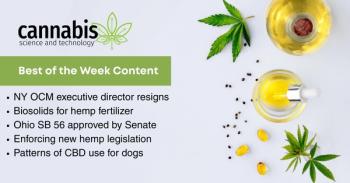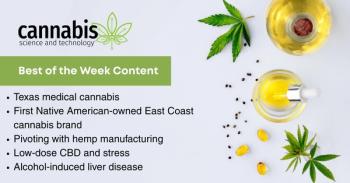
USDA Cracking Down on Organic Fraud
Consumers want options, especially when purchasing products, and organic seems to be a popular selection. It makes sense really: people eat all organic foods, why wouldn’t you want your cannabis to be organic too? Organic items are widely available and can be purchased at any grocery store, farmers market, and online. Most people associate “organic” with healthy foods that were grown using safe and sustainable agricultural methods and fewer chemicals. Organic certified products are typically pricier compared to conventionally grown crops—this can be attributed to the cost of the organic certification from an accredited third party, required use of costly organic approved chemicals, special handling practices, potential lower yield, lack of government subsidies, and so on. With organic products being sold at a higher price than conventional products and with the high consumer demand for organic products, does this combination open the door to fraud?
Where Are the Pitfalls?
Organic foods may not be as organic as you think. Unfortunately, “organic fraud” is a very real issue. The result of organic fraud is simple–consumer deception. According to the US Department of Agriculture (USDA), companies who knowingly violate the USDA organic rules can face penalties up to $11,000 per violation. Organic fraud violates federal law and the organic regulations and is punishable by financial penalties. This type of fraud may occur throughout the food system from cultivation, harvesting, processing, and through to distribution. Intentional and non-intentional organic food fraud may look like the following:
- Negligent handling or preparation practices in an organic certified facility.
- Illegally using the organic seal or labeling a product as organic without being certified.
- Marketing products or processes as organic on a website without being certified. Using fraudulent paper trails to market and label non-organic products.
- Using fake organic certifications.
- Using a co-manufacturer’s organic certificate for products not listed on their organic certification.
- Practicing non-organic methods yet marketing the product as organic certified. This includes using bioengineered seeds or plants, artificial pesticides, antibiotics, and growth hormones.
- Using non-allowable pesticides or altering pesticide testing results.
- In many cases, even using the term “Organic” in a company name that is not an organic certified facility.
Companies should never make any kind of false claims regarding their products. We have all seen the fines from the Federal Trade Commission (FTC) and cease and desist letters coming from the Food and Drug Administration (FDA). This kind of fraud is very similar in penalty to making a medical claim. Just to be safe, you should never say anything about your product that isn’t 100% true regardless of what your marketing department thinks. I have seen owners listen to their marketing people and trust that they are abiding by legal rules, but most of the time marketing people aren’t taking regulations into account and are out of compliance without even realizing it. Make sure that you are paying attention. I always recommend having your company website, marketing, and labels reviewed by a third party before printing or selling any of your products, just to be sure. Fraud is fraud in the USDA’s perspective, and they are seeking to cull out the outliers by modernizing their enforcement authorities.
Regulating “Organic” in the Food System
The USDA is cracking down on organic fraud. The agency is responsible for creating and executing laws for farming, forestry, rural economic development, and food—including overseeing organic products. More specifically, the National Organic Program (NOP) is a part of the USDA’s Agricultural Marketing Service and has regulatory oversight covering organic standards and the accreditation of certifying bodies. The NOP’s rules and regulations encompass various stages within our food system to include production, handling, labeling, and enforcement of all USDA organic products.
To help prevent organic fraud, updates to the organic standards are underway. The goal for the update is to protect organic integrity and bolster consumer confidence in the USDA organic seal. Jenny Lester Moffitt, the Under Secretary for Marketing and Regulatory Programs at the USDA, recently stated (1): “The Strengthening Organic Enforcement rule is the biggest update to the organic regulations since the original Act in 1990, providing a significant increase in oversight and enforcement authority to reinforce the trust of consumers, farmers, and those transitioning to organic production. This success is another demonstration that USDA fully stands behind the organic brand.”
Now, 33 years after going into effect, the organic standards are getting a much-needed revamp! The updates will hopefully reduce the number of uncertified entities by requiring the use of electronic import certificates, strengthening recordkeeping and supply chain traceability, and strengthening the oversight of accredited certifiers. Updates to the standards will impact more businesses in the organic supply chain, businesses engaged in buying, selling, or negotiating the sale of organic products, certifying agents, and other organic stakeholders. The final rule will be implemented by March 18th, 2024, and all businesses must comply with the final rule within 14 months from this date. Hopefully these updates will close gaps and prevent organic fraud.
What’s the Purpose of Certified Organic?
Achieving an organic certification means that the operation has undergone a robust review and inspection to verify compliance with the NOP. Being certified as organic ensures the integrity of organic products from the farm to the consumer. The certified organic seal is a recognizable symbol of consumer trust and appreciation that the brand cares about our environment’s health.
Which Cannabis Businesses Can Get Certified?
Currently, the certification is only available to hemp cultivators and hemp processors (such as product manufacturers). Because the certification is a federal designation, it is not yet available to the tetrahydrocannabinol (THC) industry. However, California is developing their own state-level certification program called “Comparable to Organic.” Additionally, the non-profit group called the Cannabis Certification Council has developed an Organically Grown Cannabis Standard and certification program for the THC industry.
What Is the Process to Get Certified?
- Step 1: Implement organic farming or processing practices into your operation by developing very specific organic standard operating procedures (SOPs) and training staff.
- Step 2: Select a USDA-accredited certifying body that has an accredited organic program for your industry. Submit the application packet and fees.
- Step 3: The certifying body reviews the application packet and conducts an onsite inspection.
- Step 4: The certifying body reviews the inspection report and may require a written corrective action plan for any violations.
- Step 5: If the corrective action plan is accepted, the certifying body issues the certification.
- Step 6: The certifying body conducts an annual review and inspection to maintain certification.
Organic certification is something that companies can do to really make their brand stand out from the rest. Unfortunately, organic certification is only available to the hemp industry at this time; due to THC’s federal illegality the USDA will not allow the organic seal on any THC products. We have helped a number of clients get “compliant” with organic standards, so when it becomes available, they will be able to get the certification right away. This all depends on if the accredited certifications will be recognized by the USDA, and at this time the USDA does not want to get involved in the THC space. Thankfully, all things change, and eventually this will be available for everyone. Just like how current good manufacturing practices (cGMP) certifications weren’t allowed for cannabis companies a mere four years ago, but is now widely available for both hemp and cannabis companies. Being proactive in your business is the best way to get ahead. I suggest companies start to think about their long-term goals now, so they know what to be prepared to do in the future.
Reference
About the Author
Kim Stuck is the CEO and founder of Allay Consulting. Direct correspondence to:
Newsletter
Unlock the latest breakthroughs in cannabis science—subscribe now to get expert insights, research, and industry updates delivered to your inbox.





